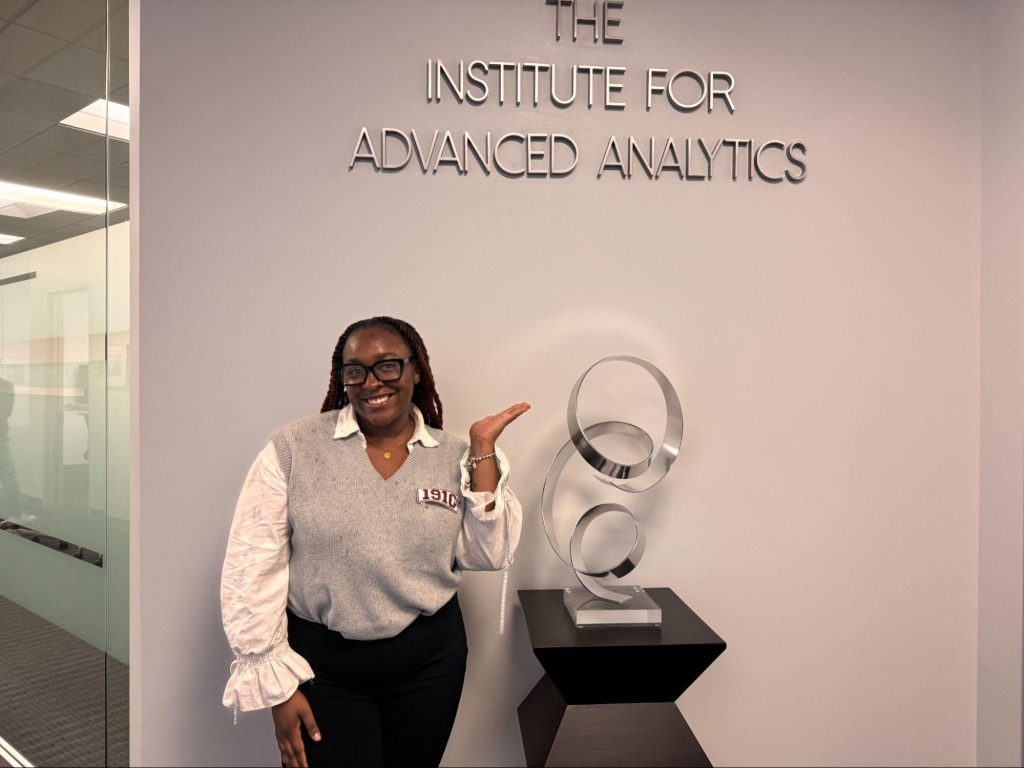
There are common stereotypes that humanities degrees are “useless,” that Historically Black Colleges/Universities (HBCUs) don’t prepare you for the real world, and that being a Black woman is a deficit in STEM fields. I’m here to challenge all that. As a Black woman who graduated from the illustrious North Carolina Central University with degrees in Psychology and English, my background has thoroughly prepared me for the Institute for Advanced Analytics.
My Psychology Degree
You see, my passion for analytics was never based on my love for math, or my out-of-this-world coding skills (read with intense sarcasm). It was my love for humanities, social sciences, and the art of connecting with people for the greater good.
In addition to conditioning myself to hit ‘Tab’ every time I write Python code, my psychology background naturally pushes me to think from fresh perspectives in the field of analytics. My professors taught me to question everything:
“How does this impact certain groups?”
“How do certain behaviors ascertain specific outcomes?”
“What can we do to improve this?”
These key analyses were incredibly helpful as I constantly questioned the impact of our practicum work on our audience.
My English Degree
When I told my undergraduate professors I was switching from English Education to data science, the collective gasp practically shook the building. I quickly reassured them that all my learning wasn’t going to waste—because, of course, nothing says data science like a Shakespearean sonnet! In all seriousness, my English degree has actually helped me translate complex data into something everyone can understand. Storytelling is a key detail in data analysis, which can be changed depending on who is reading it and who is telling it. It is important to know how to communicate information based on your audience without skewing the data or sharing false narratives. It’s about pathos: evoking emotion and connecting with your audience. The most powerful tool in analytics.
As any English major knows, critiques are just part of the writing life. It’s tough to hear feedback on something so close to your heart, but the growth is always worth it. Learning to be vulnerable to criticism from peers, professors, and even strangers has made me resilient in receiving feedback. Breaking down those walls and embracing the potential for growth is a skill that’s been invaluable at the Institute.
My Identity
According to this article from Medium, only 15% of data professionals are women, and just 4% are Black. While these numbers might seem daunting, I see them as a challenge. My experiences at my HBCU have not only prepared me to represent the underrepresented but also to advocate for anti-racist data practices and address unconscious biases, just as these Black women data professionals, listed in this article from Harvard-MIT. Like these women, I want to see myself as a data science superhero – minus the cape, and the powers, and the not-so-secret disguise. I have dreams of not only making a difference but prevailing in the face of adversity.
The Institute for Advanced Analytics is challenging, but it has helped me turn what I once saw as weaknesses into strengths. If you’re a grad student grappling with imposter syndrome, you’re not alone. Even when things get tough, never underestimate your potential. To help you stay motivated, here are some tips:
- Embrace the Learning Curve: If you don’t know something now, you will learn it. You’re in grad school to gain new skills and knowledge, so give yourself permission to grow. I’m on my way to becoming a Python-savant!
- Practice Makes Progress: Not good at something? That’s okay! With practice, you’ll improve. Don’t suffer in silence—be like me, an enthusiastic note-rewriter and lecture-re-watcher!
- Value Your Soft Skills: Creativity, communication, and leadership are incredibly valuable. Don’t underestimate them! Your passion can drive you further than you might expect. Even if the material is tough, loving what you learn can be your greatest motivator.
- Find Your Community. Connect with organizations, clubs, or individuals who share your interests or identities. You can’t navigate grad school alone—I’ve joined the Black Graduate Student Association and linked up with fellow women from my sorority who work at NC State and in the area.
- Seek Out a Mentor: Whether formal or informal, having a mentor who’s been where you are can provide invaluable guidance. I’ve found connecting with IAA alumni from similar backgrounds to be incredibly helpful.
- Practice Self-Validation: Remember, you are enough and you are needed.
Keep pushing forward, and remember—whether it’s sonnets or SQL, you’re more than up for the challenge.
Columnist: Patience Jones
